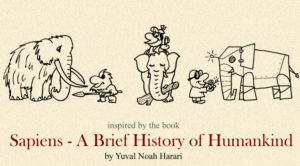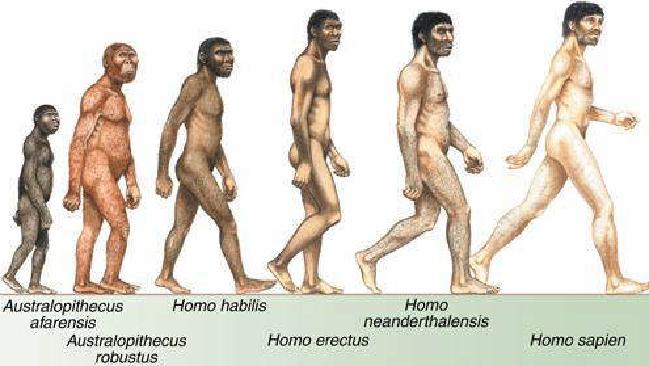Sapiens – A Brief History of Humankind
Author : Yuval Noah Harari
Genre : Popular Science, History

A beautiful and gripping history of our entire species. Harari explains how our species (Homo Sapiens… wise human) was one of the multiple Homo (humans) species that walked on Planet Earth at least 2 million years ago. However, wherever Homo Sapiens went, we probably were responsible for the extinction of all other homos, and also of many other large mammals (mammoths, large kangaroos, marsupial lions, diprotodons). No wonder the author calls us “the banana republic dictator” and “ecological serial killer”.
The book starts with the origin of universe and fundamental forces (physics) 13.5 billion years ago, followed soon by formation of atoms (chemistry), and then just 3.8 billion years ago, the formation of first living organisms (biology). Homo Sapiens, our species, started only 70,000 years ago. [Makes you wonder if God really exists and if humans were his divine creation, we took a mighty long time to realize it!]. And from those primordial origins, the book ends with a prediction of future – will we become the next God?
During the way, Harari teaches us startling facts: Did you know that while our brain is largely responsible to make us the planet’s most powerful creature, it is certainly not the most obvious evolution. 2-3% by body weight, it consumes 25% of our total energy and hence a drain on our precious resources. The author conjectures that because we, by accident, discovered fire, it helped us eat cooked food and therefore use less energy in the intestines to digest (an ape needs 5 hours, we need only one). This energy therefore can be diverted to our brain. The other consequence of large brain was that our muscles atrophied, since the same energy that in an ape or lion goes to muscle building was fueling our brain!
Another interesting fact: We started walking upright – but this meant, over many generations, narrower hips to get the right gait. Which meant women could only give birth to kids with small heads. Natural selection consequently favored earlier births. While, for most animals, the babies are ready to run in few weeks or months, a human baby needs years of careful care. This also meant, over centuries, development of social ties, and the ability of humans to learn new things.

Discussion on Agricultural to Domesticated animals: Harari is particularly unappreciative of the agricultural revolution which he calls history’s biggest fraud. He feels wheat has domesticated us, not the other way around, and that hunter-gatherers probably lived a better life than farmers. I disagree but still the arguments are fascinating (a pure cereal diet is bad for omnivores like sapiens). The portrayal of domesticated animals is particularly appalling: generations after generations, in our effort to domesticate sheep and lamb, the most aggressive ones got slaughtered early before they could give birth and pass their genes. Hence, over centuries, sheep became one of the most submissive creatures!
Discussion on Religion and Imagined Order: Religion helps us cooperate in large numbers, even if all of us really know it is a lie. Like Voltaire said: “I know there is no God, but don’t tell that to my servant lest he murders me at night”. Consumerism, for example, tells us that in order to be happy we must consume as many products and as many services as possible. But if we start questioning this myth, capitalism will collapse.
Harari, a Jew, also questions monotheists (Christians, Muslims, Jews) saying that throughout history they have been more fanatical and violent in exterminating all other religions, because they vehemently believe that they alone are in possession of the true word of God. Harari also attempts to solve the great puzzle between monotheism and dualism (former struggles to explain evil, the latter struggles to explain order) – by hilariously suggesting there is only one omnipotent God – and he is evil! He also laments nobody in history has had the stomach for such a belief.
Harari lends a kind ear to Buddhist wisdom: whatever the mind may experience, it always results in craving. When we are in pain, we want pleasure, but even when we have pleasure we are worried it may go away or desire for it to intensify. People dream for years about finding love, but are rarely satisfied when they find it. So craving almost always leads to dissatisfaction. Therefore, Gautama’s guidance to seek nirvana (literally: extinguish the fire).
Discussion on Science and Technology : The book then moves to nuclear weapons, genetic engineering and the end of homo sapiens before brazenly saying we are the animals that will become God. He shows how science has already created, for example, a fluorescent green rabbit, not the work of evolution but our knowledge and will. And how, in future, we may be able to upload our brains into hard drives and live forever as immortal cyborgs!
Harari himself is an interesting person. His online course A Brief History of Humankind has more than 100,000 subscribers. He believes the Indian Vipassana Meditation has transformed his life, is a vegan and does not carry a smartphone. Openly gay, his ‘husband’ is also his personal manager.
Why should you read the book: Incidentally, one of my biggest heroes, Bill Gates – hero not just for creating Microsoft but more for sharing his wealth and intelligence to solve our world’s problems – recommends this book highly. The book has many fascinating facts, forces you to take a deeper perspective of life, and is expressed very well. A great balance of scientific teaching and story telling (a fine balance that his sequel Homo Deus could not live unto… too many opinions and stories, and too less science). There is the occasional sensationalism and rather sweeping statements, but, in true bestseller style, it only makes the reading more exciting!
Goodreads Link: Sapiens: A Brief History of Humankind by Yuval Noah Harari | Goodreads

 This information will never be shared with third party
This information will never be shared with third party
Post A Comment
Want to join the discussion?Feel free to contribute!